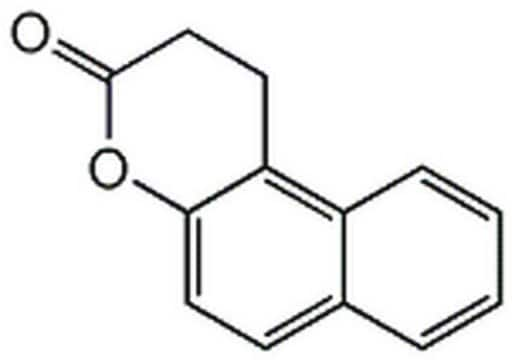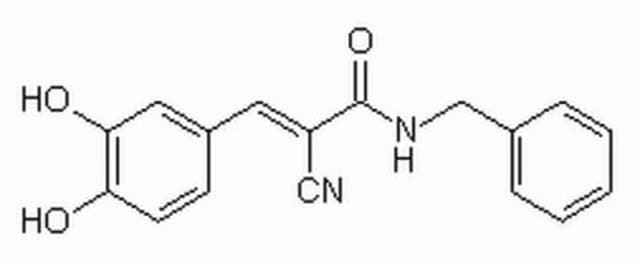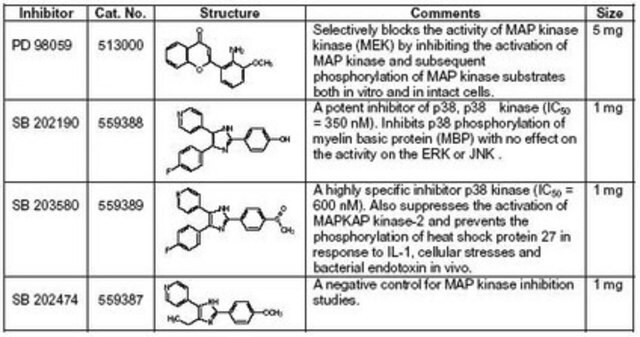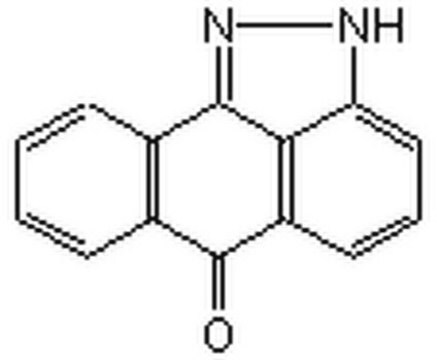658411
AG490
InSolution, ≥98%, inhibitor of EGFR kinase autophosphorylation
Synonym(s):
InSolution AG490, JAK1 Inhibitor II, JAK2 Inhibitor VI, JAK3 Inhibitor XI
Sign Into View Organizational & Contract Pricing
All Photos(1)
About This Item
Empirical Formula (Hill Notation):
C17H14N2O3
Molecular Weight:
294.30
UNSPSC Code:
12352200
NACRES:
NA.77
Recommended Products
Quality Level
Assay
≥98% (HPLC)
form
liquid
manufacturer/tradename
Calbiochem®
storage condition
OK to freeze
desiccated (hygroscopic)
protect from light
shipped in
wet ice
storage temp.
−70°C
General description
Potent inhibitor of epidermal growth factor receptor kinase autophosphorylation (IC50 = 100 nM). Jak family tyrosine kinase inhibitor. Inhibition of Jak2 by AG 490 selectively blocks leukemic cell growth in vitro and in vivo by inducing programmed cell death, with no harmful effect on normal haematopoiesis. Inhibits the constitutive activation of STAT-3 and IL-2-induced growth of MF tumor cells. AG 490 has also been shown to inhibit the autokinase activity of JAK3. Also reported to inhibit guanylyl cyclase.
Packaging
Packaged under inert gas
Warning
Toxicity: Irritant (B)
Physical form
A 100 mM (5 mg/170 µl) solution of AG490 (Cat. No. 658401) in DMSO.
Reconstitution
Following initial thaw, aliquot and freeze (-70°C). Once opened, stock solution is stable for up to 6 months at -70°C.
Other Notes
Jaleel, M., et al. 2004. Biochemistry43, 8247.
Eriksen, K.W., et al. 2001. Leukemia15, 787.
Kirken, R.A., et al. 1999. Leukoc. Biol.65, 891.
Nielsen, M., et al. 1997. Proc. Natl. Acad. Sci. USA 94, 6764.
Meydan, N., et al. 1996. Nature 379, 645.
Gazit, A., et al. 1991. J. Med. Chem.34, 1896.
Levitzki, A. 1990. Biochem. Pharmacol.40, 913.
Eriksen, K.W., et al. 2001. Leukemia15, 787.
Kirken, R.A., et al. 1999. Leukoc. Biol.65, 891.
Nielsen, M., et al. 1997. Proc. Natl. Acad. Sci. USA 94, 6764.
Meydan, N., et al. 1996. Nature 379, 645.
Gazit, A., et al. 1991. J. Med. Chem.34, 1896.
Levitzki, A. 1990. Biochem. Pharmacol.40, 913.
Legal Information
CALBIOCHEM is a registered trademark of Merck KGaA, Darmstadt, Germany
Storage Class Code
10 - Combustible liquids
WGK
WGK 3
Flash Point(F)
188.6 °F - closed cup - (Dimethylsulfoxide)
Flash Point(C)
87 °C - closed cup - (Dimethylsulfoxide)
Certificates of Analysis (COA)
Search for Certificates of Analysis (COA) by entering the products Lot/Batch Number. Lot and Batch Numbers can be found on a product’s label following the words ‘Lot’ or ‘Batch’.
Already Own This Product?
Find documentation for the products that you have recently purchased in the Document Library.
Xinxin Yue et al.
Immunity, inflammation and disease, 11(11), e1071-e1071 (2023-11-29)
Insulin resistance (IR) is considered as a major factor initiating type 2 diabetes mellitus and can lead to a reduction in glucose uptake that mainly occurs in the liver. Astragalus polysaccharide (APC), extracted from the traditional Chinese medicine, has been
Naoki Yoshida et al.
Disease models & mechanisms, 16(10) (2023-10-17)
Cleft palate has a multifactorial etiology. In palatal fusion, the contacting medial edge epithelium (MEE) forms the epithelial seam, which is subsequently removed with the reduction of p63. Failure in this process results in a cleft palate. We herein report
Andrea Arena et al.
International journal of molecular sciences, 24(14) (2023-07-29)
NFE2L2 and STAT3 are key pro-survival molecules, and thus, their targeting may represent a promising anti-cancer strategy. In this study, we found that a positive feedback loop occurred between them and provided evidence that their concomitant inhibition efficiently impaired the
Kathryn S Potts et al.
Cell reports, 41(11), 111825-111825 (2022-12-15)
Hematopoietic stem and progenitor cells (HSPCs) sustain lifelong hematopoiesis. Mutations of pre-mRNA splicing machinery, especially splicing factor 3b, subunit 1 (SF3B1), are early lesions found in malignancies arising from HSPC dysfunction. However, why splicing factor deficits contribute to HSPC defects
Our team of scientists has experience in all areas of research including Life Science, Material Science, Chemical Synthesis, Chromatography, Analytical and many others.
Contact Technical Service